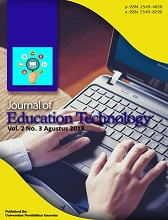THE IMPLEMENTATION OF TAI TYPE COOPERATIVE LEARNING WITH PEER TUTOR TO IMPROVE STUDENTS’ ACHIEVEMENT ON INDONESIAN LANGUAGE
DOI:
https://doi.org/10.23887/jet.v1i1.10082Keywords:
cooperative learning, TAI, achievementAbstract
This present study aims at improving students’ achievement in Indonesian language through tai type cooperative learning with peer tutor in the academic year of 2015/2016. This study is a classroom action research and takes place at SMPN 1 Seririt from September to November 2015. It undergoes preliminary study to the action. A total number of 34 students consist of 16 female and 18 male are purposefully selected as the sample of this study. The researcher focuses on the evaluation on the first cycle and the second cycle after implementing technique. This study results in finding out that tai type cooperative learning with peer tutor has successfully improved students’ achievement on Indonesian language in the academic year of 2015/2016. This is reflected by the improvement of the students’ score with 85.29% of them have fulfilled the criteria of success in the first cycle. Nonetheless, there are 94.12% students who passed the criteria of success.
References
Agung, G. A.A. (1997). Pengantar Evaluasi Pengajaran. Singaraja: STKIP Singaraja
Achmad, A. (2003). Implementasi Model Cooperative Learning dalam Pendidikan IPS di Tingkat Persekolahan. http:// www.depdiknas.go.id/jurnal/43/rusdy-a-siroj.htm. Access June 2nd 2007.
Adnyana, P.B. (2006). Pengaruh Penggunaan Model Siklus Belajar dalam Pembelajaran IPS terhadap Penguasaan Konsep, Penalaran, Dan Keterampilan Inkuiri Peserta didik SMP Laboratorium IKIP Negeri Singaraja. Jurnal Penelitian IKIP Negeri Singaraja.
Ardana, I M. et al. (2005). Implementasi Pembelajaran Kooperatif TAI Berorientasi Gaya Kognitif Sebagai Upaya Penyesuaian Strategi Pembelajaran Matematika dengan Kemampuan Peserta didik SD yang Beragam di Singaraja. Jurnal Penelitian IKIP Negeri Singaraja.
Arikunto, S. (2005). Prosedur Penelitian. Jakarta: Bima Aksara
Bundu, P. (2003). Pengaruh Evaluasi Formatif dan Gaya Kognitif Terhadap Hasil Belajar IPA. Jurnal edukasi. 4(1) pp. 31- 38.
Candiasa, I M. (2002). Pengaruh strategi pembelajaran dan gaya kognitif terhadap kemampuan memprogram komputer. Dessertation (unpublished). Program Pasca Sarjana Universitas Negeri Jakarta.
Candiasa, I M. (2006). Pendidikan Berbhinneka. Disampaikan Pada Sidang Terbuka Senat Institut Keguruan dan Ilmu Pendidikan Negeri Singaraja. Monday, January 31st 2006. Institut Keguruan dan Ilmu Pendidikan Negeri Singaraja.
Dewi, A.A.R. (2006). Penanganan Kelompok Bermasalah Melalui One By One Plus dalam Pembelajaran Kooperatif Berorientasi Gaya Kognitif sebagai Upaya Meningkatkan Interaksi dan Hasil Belajar Matematika Peserta didik Kelas VI SD Negeri 6 Banjar Jawa. Thesis (unpublished). IKIP Negeri Singaraja.
Hermayani, L. (2006). Implementasi Pembelajaran Kooperatif Tim Assisted Individualization (TAI) Berorientasi Gaya Kognitif sebagai Upaya Meningkatkan Kemampuan Komunikasi Matematika Peserta didik Kelas 5 SD Negeri 6 Banjar Jawa. Thesis (unpublished). IKIP Negeri Singaraja.
Liu, Y. & Ginter, D. (1999). Cognitive Styles and Distance Education. http://www.westga.edu/~distance/liu23.html. Access November 2nd 2007.
Marguna, G. (2007). Pengaruh Model Pembelajaran Kooperatif dan Tipe Masalah Terhadap Kemampuan Berpikir Kritis Peserta didik Kelas X SMA Laboratorium Undiksha Singaraja Tahun Pelajaran 2006/2007. Thesis (unpublished). IKIP Negeri Singaraja.
Musser, T. (1997). Individualdifferences: How field dependence-independence affects learners. http://www.personal.psu.edu/staff/t/x/txm4/paper1.html. Diakses tanggal 2 November 2007.
Nur, M. (2004). Teori-teori Pembelajaran Kognitif. Pusat Sains dan Matematika Sekolah, Universitas Negeri Surabaya.
Redhana, I W. & Widana, S. (2002). Penerapan strategi pemecahan masalah dalam pembelajaran generatif sebagai upaya untuk meningkatkan kualitas pembelajaran kimia dasar pada mahapeserta didik TPB Jurusan Pendidikan Kimia IKIP N Singaraja tahun akademik 2001/2002. Research Report (unpublished). Fakultas Pendidikan MIPA, IKIP Negeri Singaraja.
Redhana, I W. (2003). Meningkatkan keterampilan pemecahan masalah dan pemahaman mahapeserta didik Jurusan Pendidikan Kimia Fakultas Pendidikan MIPA IKIP Negeri Singaraja melalui metode pembelajaran kooperatif dan open-ended laboratory praktikum biokimia I pada tahun akademik 2002/2003. Research Report (unpublished). IKIP Negeri Singaraja.
Arsana, R.( 2007). Penggunaan Diskusi Kelompok Untuk Meningkatkan Motivasi Belajar Peserta didik Kelas XI IPS III SMA Negeri 2 Singaraja. Thesis (unpublished). Jurusan Bimbingan Konseling Fakultas Ilmu Pendidikan Undiksha Singaraja.
Sanjaya, W. (2006). Strategi Pembelajaran Berorientasi Standar Proses Pendidikan. Jakarta: Kencana
Sardiman A.M. (2001). Interaksi dan Motivasi Belajar Mengajar. Jakarta: PT. Raja Grafindo Persada.
Slavin, R. E. (1995). Cooperative learning 2ed. Needham Height, Masachuetts: Allyn and Bacon.
Slameto. (2003). Belajar dan Faktor-faktor yang Mempengaruhinya. Rineka Cipta : Jakarta
Suparno, P. (1997). Filsafat Konstruktivisme dalam Pembelajaran. Kanisius : Yogyakarta
Yasa, R. (2005). Pengaruh Pembelajaran Kooperatif TAI dengan Penanganan Kelompok Bermasalah Melalui One By One Plus terhadap Kemampuan Komunikasi Matematika Peserta didik Kelas VII SMP Negeri 3 Singaraja. Thesis (unpublished). IKIP Negeri Singaraja.
Downloads
Published
How to Cite
Issue
Section
License
Authors who publish with the Journal of Education Technology agree to the following terms:
- Authors retain copyright and grant the journal the right of first publication with the work simultaneously licensed under a Creative Commons Attribution License (CC BY-SA 4.0) that allows others to share the work with an acknowledgment of the work's authorship and initial publication in this journal.
- Authors are able to enter into separate, additional contractual arrangements for the non-exclusive distribution of the journal's published version of the work (e.g., post it to an institutional repository or publish it in a book), with an acknowledgment of its initial publication in this journal.
- Authors are permitted and encouraged to post their work online (e.g., in institutional repositories or on their website) prior to and during the submission process, as it can lead to productive exchanges, as well as earlier and greater citation of published work. (See The Effect of Open Access)

















